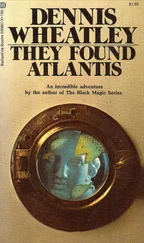On his asking where they were going, Pelayo replied, 'Why, I promised to show you the city, didn't I, and you'll get no better view of it than from Mount Tibidabo.' And he proved unquestionably right. After changing trams in the suburbs, they took a Funicular Railway, but even that did not take them to the top, and for the final lap they had to trudge, with a little crowd of other people who had been in the Funicular, up steep paths through a wood of pines. When at last, breathless and perspiring, they did reach the summit the panorama from it was one never to be forgotten. From a height of sixteen hundred feet they gazed down on the broad coastal plain with the sprawling city spread out with its centre far below them. The air was so clear that they could pick out all the Principal buildings and, looking south over many miles of the shimmering Mediterranean, even discern some faint smudges on the horizon that Pelayo said were the Balearic Isles.
The mountain had a broad, flat top on which a number of cafes and restaurants had been built and, as it was a Sunday, they were crowded with people; but Pelayo managed to secure a table at which they sat drinking iced beer while admiring the view. Up there, too, was a permanent fun fair and, after lunching off spider crabs, they patronized some of its sideshows.
Late in the afternoon they returned to the city and, much to de Quesnoy's secret satisfaction, the evening, if less relaxing, proved unexpectedly profitable from the point of view of his mission; for Modesto took him to a club to which he belonged that was a branch of the Somaten.
Among the subversive pamphlets which had formed part of the papers that Don Alfonso had secured for him there had been some issued by the Somaten, and also a short account of its history; so he was already aware of its activities. It was a disciplined organization that had been formed by private citizens of Barcelona in the Middle Ages with the object of maintaining order, and its motto was 'Peace, peace and again peace'. But in more recent times it had become the spearhead of the movement for Catalan nationalism.
De Quesnoy had both read the arguments for that in the pamphlets and discussed it with de Vendome; so he knew both sides of the question. The Catalans' case was that their stock inhabited the Mediterranean coast on both sides of the Pyrenees, occupying both the whole of Catalonia and a considerable area of southern France including Marseilles, and that at one time they had been one nation. They therefore claimed that as an individual race, neither French nor Spanish, they were entitled to independence. That their language was still a live one was true, although much more so in the Spanish area than the French, and in Barcelona several papers printed in Catalan were among those with the largest circulation. They had also clung most tenaciously to their racial customs and to certain regional rights extracted through the centuries from their Spanish rulers, and on these they based their case for being given self-government.
The opposite view was that since very ancient times the Catalans never had been independent. Those to the north of the Pyrenees had in Roman times been absorbed into the provinces of Nar-bonensis and Provence and later became subjects of the Kings of France; while those to the south had been absorbed into the province of Hither Baetia and later become subjects of the Kings of Aragon. Therefore, from the time of the marriage of Ferdinand of Aragon to Isabella of Castile in 1469, Catalonia had become an integral part of Spain, and should so remain.
The same arguments applied to the Basques, who were also agitating for independence. On the Atlantic coast their stock had from time immemorial occupied large areas both to the north and south of the Pyrenees, and they even had a language of their own which resembled no other in Europe; but they too had never been a nation and, for many centuries, while those to the north had owed allegiance to the Kings of Navarre, those to the south had owed allegiance to the Kings of Castile.
One might almost as well endeavour, reasoned the anti-separatists, to make a case for the peoples of Brittany and Cornwall becoming one nation with self-government, for they too come of the same stock and had a root language in common, and Brittany at least was - for a long period - a Sovereign State; yet the English Channel has separated them hardly less effectively than the Pyrenees has both the Catalans and the Basques.
For the Spanish Catalans and Basques, union with the French elements of their race could obviously be only a long-term aim, but the agitation by both for Home Rule had in recent years greatly increased. This was especially so among the Catalans as they were the most vigorous and industrious of the Spanish peoples, and much fuel was added to the fire of their unrest by the knowledge that the hard work they put into their commercial ventures led to their having to contribute far more per head in taxation to the central government than did the lazier populations in other parts of Spain.
Since the aim of the Somaten was to throw off the yoke of the monarchy and that of the anarchists to abolish government of any kind - and Dona Gulia had told the Count that Barcelona was the stronghold of Spanish anarchy - he had good grounds for assuming that, both being subversive organizations, many members of the Somaten were also anarchists. In consequence he spared no pains to make himself pleasant to those members of the Club to whom Pelayo introduced him.
In their grave Spanish way they responded readily, and when they learned that he was a refugee from Tsarist persecution they eagerly crowded round pressing him to tell them about conditions in Russia. He willingly obliged, purposely exaggerating the situation by implying that the whole nation, except for a handful of aristocrats, went about in constant terror of having something pinned uPon them by the Secret Police, and that every political exile was condemned to the horror of the Siberian salt mines.
Naturally, when the question arose, he declared himself heartily in favour of Catalonian independence, and 'Nicolai Chirikov' was obviously so much a man with the right ideas that by midnight he had been proposed and accepted as a member of the Puerto branch of the Somaten.
His original plan had been to join one of the Barcelona Lodges of Freemasons; since once a Mason always a Mason, and having been initiated in Paris two years earlier he would have had only to find, through the secret hand-grip, a Brother Mason to introduce him. Unlike British Masonry, Continental Masonry had for long been the principal breeding-ground of atheism and revolt. It had originated in Germany and in the mid-eighteenth century been brought by the mystic Illuminatii to France. There it had spread rapidly, so that there were soon Lodges of the Grand Orient in every town of any size; and its inner council had undoubtedly organized the French Revolution. Its ramifications spread all over Europe and it had later been responsible for all those bloody upheavals that overturned half a dozen governments in the years 1848 and '49. Fifty years later it was still a great secret power capable of bringing about revolts in most countries at any time.
In 1904, in collaboration with the atheist War Minister of France, it had launched a great campaign to undermine the strength of the French Army, and de Quesnoy had become a Freemason with the object of exposing this evil combination. Under the name of Vasili Petrovitch, and posing as a Russian political refugee, he had succeeded in doing so; and now, feeling certain that the Spanish Masonic Lodges would be the natural meeting places for anarchists, he had been contemplating on his way to Barcelona an attempt to repeat the process. Unfortunately, however, having exposed the War Minister he had, at the eleventh hour, been exposed himself; and the Freemasons had learned that their betrayer, Vasili Petrovitch, was in fact Colonel the Count de Quesnoy.
Читать дальше












